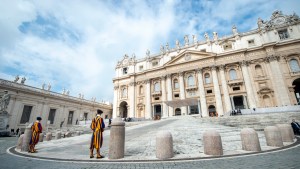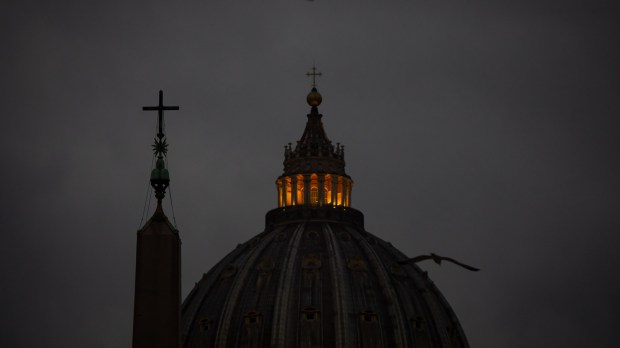Lenten Campaign 2025
This content is free of charge, as are all our articles.
Support us with a donation that is tax-deductible and enable us to continue to reach millions of readers.
On Saturday, December 16, 2023, the Vatican tribunal will announce the long-awaited verdicts on the financial trial revolving around charges of corruption, embezzlement, and more leveled against 10 defendants, including Italian Cardinal, Angelo Becciu.
After 85 hearings and two and a half years since the beginning in July 2021, the Vatican trial — sometimes dubbed “of the century” — will come to an end. Centered around how the Vatican’s Secretariat of State invested in a luxury building at 60 Sloane Avenue, in London, the trial also includes other cases of alleged mismanagement of the Holy See’s funds.The prosecution claims that the Secretariat of State lost between 139 and 189 million euros (around 152 to 207 million dollars) in the so-called London building affair.
Aleteia summarizes the key points of the trial.
10 defendants
In July 2021, after an investigation that began in 2019, 10 people were accused by the Vatican Office of the Promoter of Justice (prosecutor’s office) of a wide range of crimes, from embezzlement, to corruption, to abuse of office and more. The highest ranking Vatican official to be accused was Italian Cardinal Angelo Becciu, who was substitute of the Secretariat of State, the number 3 of the Holy See, from 2011 until September 2018. In September 2020, Pope Francis revoked the cardinal’s rights and privileges and asked him to resign as prefect of the Dicastery for the Causes of Saints, shortly before news articles started emerging about the financial scandals being investigated.
The other defendants are: two brokers who managed the 60 Sloane Avenue building, Raffaele Mincione and Gianluigi Torzi; a lawyer who worked with the latter, Nicola Squillace; two employees of the Secretariat of State, Fabrizio Tirabassi and Monsignor Mauro Carlino; a financial consultant, Enrico Crasso; two former heads of the Vatican’s anti-money laundering department, René Brülhart and Tommaso di Ruzza; and lastly a woman who styled herself as an intelligence expert and analyst, Cecilia Marogna.
All of the defendants deny wrongdoing. In total, for all 10 of the people involved, the prosecution has asked for over 73 years of prison and thousands of euros in fines. For Cardinal Becciu, for example, who is accused of embezzlement, abuse of office, and witness tampering, the prosecution requested seven years and three months in prison, a permanent ban on holding a public office at the Vatican, a 10,329 euro fine and the confiscation of 14 million euros.
The main issue
The issue began in 2013 when the Secretariat of State invested 200 million euros in a fund administered by a British-Italian broker, Raffaele Mincione, in order to have a stake in a building located on 60 Sloane Avenue. In 2018, the Secretariat of State decided to change the administrator of the investment as, according to the prosecutor, Mincione’s fund had lost money. The prosecution claims the Secretariat of State’s money was mismanaged, which Mincione denies.
In November 2018, the Secretariat of State then signed two contracts passing the building investment from Mincione’s fund to another fund, operated by Italian broker Gianluigi Torzi. However, this operation caused the Holy See to give control of the building to Torzi, as he had acquired voting shares that gave him greater authority over the property, while the Holy See only had non-voting shares. The Vatican then paid Torzi some 15 million euros in May 2019 — an extortion according to the prosecution — to get back control of the building.
In the beginning of 2019 the Secretariat of State also asked the Institute for the Works of Religion (IOR), the Vatican’s private bank, for a loan to pay off a hefty mortgage of 150 million euros on the building. The IOR’s director found this demand suspicious and ended up notifying the prosecutor’s office, leading to the beginning of the investigations that resulted in the trial.
Other than the financial dealings concerning the 60 Sloane Avenue building, the trial also touches on other money transfers and alleged financial relations involving the 10 defendants. For example, Cardinal Becciu is also accused of sending 125,000 euros of the Secretariat of State to a charity cooperative run by his brother in his diocese of origin in Sardinia, Italy. He argues this transfer was justified and that the money was used by the diocese for charitable activities.
Similarly, he is also accused of sending 575,000 euros to Cecilia Marogna, in order for her to free a Colombian nun, kidnapped in Mali by Islamic militants. Marogna is accused of spending this money on personal expenses such as luxury goods and hotel stays. The cardinal argues he believed she would use the money to pay an intelligence company to free the nun, and that the Pope had reportedly approved for Becciu to try and negotiate the liberation.
85 hearings, 60 witnesses, and countless discussions and twists
In the 85 hearings that have made up the trial, 60 witnesses were heard and many twists and turns led to new revelations that put the judicial system to the test. One important moment was when the credibility of an initial suspect-turned-witness, Monsignor Alberto Perlasca, was put into question.
From 2009 to 2019, Perlasca was the head of the Secretariat of State’s administrative office, which was in charge of the investments discussed in the trial. Although initially investigated as a possible suspect, he then became an important witness in the case, blaming his former superior, Cardinal Becciu, and other defendants for the affair.
During a hearing in January 2023 it emerged that Perlasca’s testimony was influenced by a family friend and by Francesca Immacolata Chaouqui, a former employee of a papal commission. She was convicted by the Vatican tribunal in 2015 for conspiring to leak classified information and reportedly blamed Cardinal Becciu for her trial. Defense lawyers have argued that Perlasca’s testimony is not credible, while the prosecution has countered that in any case, they have not made his declarations the “cornerstone” of their arguments.
Several defense lawyers have also put into question certain judicial aspects of the process, which they argue did not guarantee their defendants a fair trial. For example, they contested the fact that the Pope issued four “secret” decrees during the investigation that led to the trial, which the lawyers did not have access to. These decrees are said to have strengthened the prosecution’s investigative powers, such as for example allowing them to wiretap phone calls. The prosecution argued the decrees were necessary to “regulate” their activities and did guarantee the rights of the defendants.
After two and a half years, many discussions, and sifting through thousands of documents, emails, text messages, and more, the judges of the Vatican tribunal will finally make their decision on December 16.


